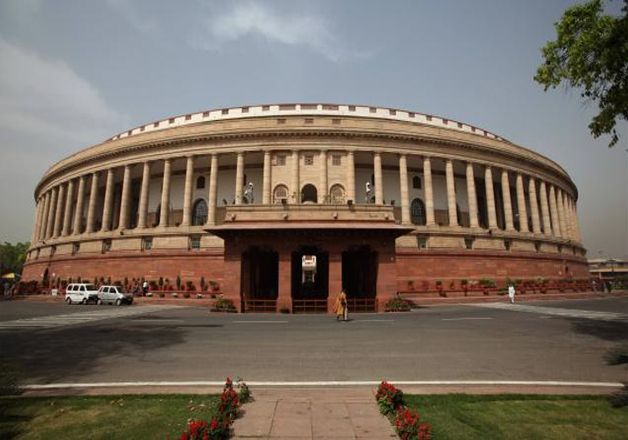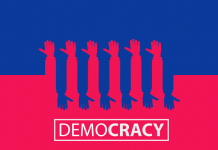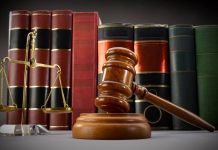This article is written by Rashmi Jha from Amity University, Mumbai. This article is about the protection and relation between democracy and human rights.
Table of Contents
Introduction
Human rights and democracy have a very close relationship. Human rights cannot exist in a totalitarian (undemocratic) country. On the other hand, a democratic state must guarantee the existence of human rights. A country can be said to be democratic if it respects and protects human rights. The condition needed to realise the upholding of human rights is democratic values within the framework of the rule of law.
The concept of the rule of law can be considered to represent the model of a democratic state. Implementing a democratic state is actualised through a system of good governance based on representative government, which reflects indirect democracy. According to Friedrich Julius Stahl and A.V. Dicey, the rule of law must fulfil several essential elements: guaranteeing human rights. Thus, to be called a state of law, there must be protection and respect for human rights.
While discussing whether democracy is the best system to protect human rights, we need to look at the opinion of Benedict de Spinoza, a philosopher who had such great political views. According to him, democracy is the best system of governance because it is the most natural and most in line with human freedom.
In addition, in a democracy, the citizens freely and actively participate in building the country. Democracy also aims to avoid irrational desires and guide humans as much as possible to live under the guidance of the government so that they can live in peace and harmony. In short, in a democracy, the freedom of humans to express themselves as rational beings is guaranteed. The following is Spinoza’s view of democracy.
The basic aim of democracy is to avoid irrational desires and to bring people as far as possible to live under the guidance of reason so that they can live in peace and harmony. Democracy is also the most natural system of government and is most compatible with human freedom. In a democracy, a person does not give absolute natural rights rather, they are granted by the community. Therefore, all humans remain the same as when they were in a state of nature.
Spinoza’s concept of democracy is closely related to his most basic view of self-determination. The democratic system of government opens the opportunity for each individual to jointly determine the development of society and the rules of living together and as a consequence determine themselves. Democracy is the best political system because it believes in the power of many people who can strengthen unity and ensure the welfare of many people.
In addition, in a democracy, every citizen has an adequate opportunity to influence the law-making process. Thus, law-making is not a monopoly of certain people. The involvement of citizens in making laws means that the laws or regulations of the country are truly useful for the interests of many people. This shows that people who live in democratic countries are freer as in the state of nature than people who live in other government systems.
Citizen participation in the democratic process in a country will be realized when freedom of thought, speech, and religion is guaranteed. Through these freedoms, each person actualizes himself as a rational being. He struggles to determine himself, to control his life according to the guidance of reason in order to achieve happiness in his life.
In the following, we will explore specifically the individual freedoms (thinking, speaking, and religion) which cannot be taken away by anyone and need to be guaranteed in a democratic country.
Freedom of thought
The state does not have the power to force people to think or not to think about something. People cannot give up their right to think, as they are the master of their thoughts. Their freedom of thought cannot be conquered by anyone. Therefore, any individual who thinks about things differently from others cannot be forced to speak and think according to the conscience of the supreme ruler.
Spinoza’s view contains the hope that instates freedom of thought must be upheld and guaranteed by the state. According to Spinoza, a good state will give its citizens the opportunity to think according to what they like and speak according to what they think. Guaranteed freedom of thought certainly makes citizens safe and experience happiness in their lives.
Freedom of speech
In the life of the state, everyone is free to speak or express their opinion. Humans speak to express their thoughts, feelings, hopes, and beliefs. If there is a ruler who forces someone to speak not according to what they think but according to the will of the ruler, then that action is despotism and is a form of destroying human freedom. This shows that freedom of speech is a natural right that cannot be conquered by others. The act of repression or coercion not to speak is very dangerous because the citizens will protest in order to fight for their freedom.
Religious freedom
Every human being has the right to determine what is best for the happiness of his life. Reason enables humans to find what is useful for themselves. According to Spinoza, every human being has the right to embrace a certain religion. In this regard, no one can force someone to embrace or not embrace a particular religion. The right to embrace religion is a natural human right that cannot be intervened by other parties. Thus, the state, community organizations, or certain religions do not have the power to force someone to adhere to or not to adhere to a theory and the practice of a certain religion.
Christian and David stated that there was no significant effect of democracy in human rights violations but on another level, it influences negatively. This means that democracy is not the main way for the protection of human rights. Democracy cannot fully protect human rights. Although in theory proposed by Spinoza, this democracy is best for meeting human rights needs in general. This statement makes human rights issues even more complex. What system of government can actually fully protect human rights?
There is still much debate about democracy and its relation to human rights. Spinoza’s claim of democracy is the best but it still needs a lot of comprehensive research. Many countries that do not adopt democracy can still fulfil human rights for their people. For example, an authoritarian government is also responsive to protecting human rights as well as a government that adopts a democratic system.
This proves that democracy cannot always improve the quality of human rights protection. Everything goes back to the individual starting from the community, government, and also legislators. It takes hard work from the international community to continue to promote human rights regardless of the government system.
Tony Evans said that the democratic system is more concerned with the economy than the protection of human rights. In theory, democracy sells human rights as one of the main goals, but in practice, democracy is only used to increase global economic interest, especially in less developed countries. To tackle it, everyone should take part in improving human rights globally and interrogate how international organizations promote human rights. Thus, democracy will no longer be a face shield for the global economy.
Relation between democracy and human rights
The political process from the ideology of human rights to the implementation of human rights is an aspect of the political dimension of human rights. This point highlights the historical dimension of human rights. If you carefully observe this aspect of the historical dimension of human rights, you will find that the experience of injustice often produces a general feeling that mankind must stop, eliminate and prevent these injustices in the future.
The 1948 Universal Declaration of Human Rights can be understood as a response to violations of the basic elements and areas of human existence, as well as an attempt to deny human dignity during the holocaust. Johannes Morsink explained: “Most of the provisions and rights of the Declaration were adopted as a direct response to the horrors of the Holocaust.” This historical dimension does not exclude human rights, which can be further developed when necessary.
On the contrary, taking the historical nature of human rights seriously will open our eyes to such injustices, and we need to support responses to injustices in order to protect human rights. “The human rights violation in the editor’s mind in 1948 occurred due to the 1948 massacre. Today we can not only point out the atrocities committed by the Nazis, but also point out the atrocities in Bosnia, Cambodia, Rwanda, Darfur, and other regions”. Even this historical dimension of human rights, due to its historical contingency, will not lead to the end of the universality of human rights, because the historical positioning and interpretation of the origin of human rights explain historical injustice in a demonstrative way, and there is no potential for a moral justification of human rights.
The analysis of the historical development of human rights makes further contributions to the discourse of human rights. It displays the arguments and processes from a historical perspective and provides valuable systematic insights. Although in the historical dimension of human rights, the issue of ‘how to deal with’ is still an unresolved issue for the emergence of human rights, ‘why’ everyone enjoys human rights.
It is a part of the ethical size of human rights to deal with the query of the ‘why’. The discourse about the motives why each individual is a right-holder is of significance due to the fact that human rights did not fall from heaven. Human rights aren’t an ‘absolute truth’. The necessity of a justification of human rights is likewise provoked by means of the relation among human rights and corresponding duties: each individual isn’t always best a right-holder however additionally wishes to appreciate the human rights of others. In order to stay coherent with their very own idea, the life of human rights relies solely on the opportunity in their justification. Human rights have to be justified to anyone involved with human rights.
Since democratic principles are part of human rights, democracy is based on human rights. Democracy can also be understood as the expression of a system that respects individual autonomy, which enables them to participate in the formation of opinions and the decision-making process in the legal system where you live as a citizen. At this point, the problem with modern democratic societies seems to be that not all rights holders can participate in the decision-making of the legal society. A person living in this legal society without the citizenship of a particular nation. Changing the community voting access is the first step in solving this problem.
The second question is as follows. For things that violate the human rights of a few people. We do not need to study history too deeply to find some examples of such theoretical observations. I worry that the clever case of banning the construction of minarets is an example. The majority vote in a democratic process to support laws that discriminate against minorities in the national legal system, in which case they are not allowed to build minarets. In the past, everyone, including religious groups and Muslim groups, had to abide by the Swiss building codes when planning and to construct buildings. The ban violated the religious freedom of this minority group. This example shows that in the context of the so-called democratic process, a simplified understanding of democracy can lead to human rights violations. Why is it a “reductionist”? The ideas and concepts of democracy include human rights. Because democracy is based on human rights. First of all, it is the principle of democracy as a part of human rights. Therefore, respect for human rights is part of the democratic system.
Therefore, democracy must have mechanisms to ensure that human rights participate in democratic opinions and decision-making. The process, and the design of these processes, because the possibility of democratic decision-making that violates human rights is excluded from the beginning. As a measure of democracy, it is well known that in a democratic system, respect can be guaranteed in various ways. For example, the Constitution and the Supreme Court should be established in non-existent democracies in order to realize human rights widely.
Human rights education can face these challenges and eliminate the naive assumption that everyone is born democratic and has the skills and abilities to participate in the formation and decision-making of democratic opinions. Thomas Hammarberg emphasized at an expert seminar to prepare the UN Declaration on Human Rights Education: “Communicating their human rights to citizens will create an informed society, which in turn will strengthen democracy”. In Marrakech, in 2009 the United Nations High Commissioner for Human Rights Navanethem Pillay described the expectations for human rights education: human rights education is for preventing human rights violations, promoting non-discrimination, equality and sustainable development, and promoting people’s participation in democracy. Decision-making process”. Human rights education contributes to the operation of democracy.
Democracy and human rights are mutually reinforcing. This means that everyone has the right to democracy. Can human rights be realized in an undemocratic political and legal system? No, if the political and legal system is not democratic, human rights cannot be fully realized, because everyone participating in the formation and decision-making of public opinion is protected by human rights. The relation between democracy and human rights is that human rights play an important role in democracy as a framework and frame of reference. Democratic opinions and decision-making processes must respect human rights when functioning.
This complex relationship between democracy and human rights reveals the necessity of democratic education. It goes beyond the reductionist understanding of democracy and only considering the rights of the majority and the necessity of human rights education. Human rights education is an important foundation for the realisation of human rights, and everyone must understand their rights. In today’s diverse society, human rights education is “necessary” rather than “pleasant”.Human rights make possible peaceful coexistence, respect for the human dignity of others, and show tolerance and tradition, cultural and religious boundaries, world views and opinions; when human rights enable a person to participate in the democratic process of public opinion formation and decision-making; human rights protect minorities from the influence of majority decisions that violate human rights.
Conclusion
In theory, democracy is indeed one of the best systems that can protect human rights, but that claim is just a claim. There are still many countries that adopt a democratic system but there are still many violations of human rights. Democracy is a form of a country’s political system and also a nation’s political culture.
Winston Churchill admits honestly that democracy is not really the best system of government, but that there is no other system that is better than it. This shows that this democracy is indeed unique. These various types of political regimes around the world call themselves democracies, although what regimes say and do often differ substantially from one another. Indeed, the history of the conception of democracy is very complex and is marked by conflicts of conception. On the other hand, human rights themselves have the complexity to be guaranteed in any kind of political system.
Human rights must be the moral foundation for all parties in a country. Democracy provides a wide door for the government to try to be a representative government and guarantee human rights through legislation. We should recognize democracy for what it is, a form of political association that has social preconditions and embodies particular values, rather than a universal prescription for achieving the conditions of a decent human life. All citizens need to interpret and uphold human rights more than anything from the people, their government, and legislators. All sections unite to monitor and improve human rights.
References
- https://www.ohchr.org/en/Issues/RuleOfLaw/Pages/Democracy.aspx#:~:text=Democracy%20is%20one%20of%20the,are%20essential%20 elements%20of%20democracy.
- https://www.sociostudies.org/almanac/articles/the_relation_between_democracy_and_human_rights/
- https://www.government.se/government-policy/democracy-and-human-rights/
- https://www.democracy-international.org/human-rights
LawSikho has created a telegram group for exchanging legal knowledge, referrals, and various opportunities. You can click on this link and join:
 Serato DJ Crack 2025Serato DJ PRO Crack
Serato DJ Crack 2025Serato DJ PRO Crack











 Allow notifications
Allow notifications


